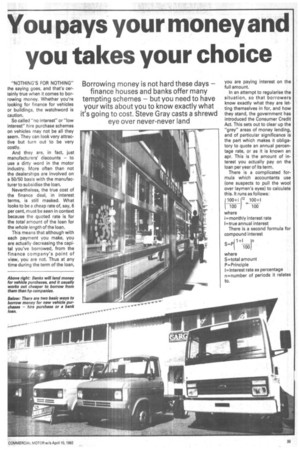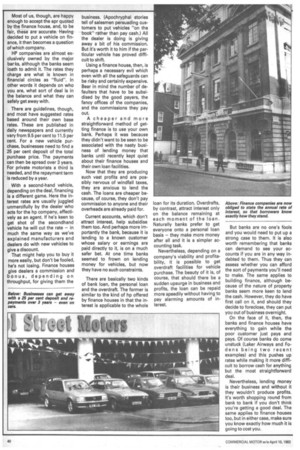You pays your money and you takes your choice
Page 33

Page 34

If you've noticed an error in this article please click here to report it so we can fix it.
Borrowing money is not hard these days — finance houses and banks offer many tempting schemes — but you need to have your wits about you to know exactly what it's going to cost. Steve Gray casts a shrewd eye over never-never land
"NOTHING'S FOR NOTHING" the saying goes, and that's certainly true when it comes to borrowing money. Whether you're looking for finance for vehicles or buildings, the watchword is caution.
So called "no interest" or "low interest" hire purchase schemes on vehicles may not be all they seem. They can look very attractive but turn out to be very costly.
And they are, in fact, just manufacturers' discounts — to use a dirty word in the motor industry. More often than not the dealerships are involved on a 50/50 basis with the manufacturer to subsidise the loan.
Nevertheless, the true cost of the finance deal, in interest terms, is still masked. What looks to be a cheap rate of, say, 6 per cent, must be seen in context because the quoted rate is for the total amount of the loan for the whole length of the loan.
This means that although with each payment you make, you are actually decreasing the capital you've borrowed, from the finance company's point of view, you are not. Thus at any time during the term of the loan, you are paying interest on the full amount.
In an attempt to regularise the situation, so that borrowers know exactly what they are letting themselves in for, and how they stand, the government has introduced the Consumer Credit Act. This sets out to clear up the "grey" areas of money lending, and of particular significance is the part which makes it obligatory to quote an annual percentage rate, or as it is known an apr. This is the amount of interest you actually pay on the loan per year of its term.
There is a complicated formula which accountants use (one suspects to pull the wool over laymen's eyes) to calculate this. It runs as follows:
I 100+1 112 100+1
100 I — 100 where i= monthly interest rate 1=true annual interest There is a second formula for compound interest
s=p( 1 +I In
where S=total amount P=Principle 1= Interest rate as percentage n=number of periods it relates to. 100
Most of us, though, are happy enough to accept the apr quoted by the finance house, and, to be fair, these areaccurate. Having decided to put a vehicle on finance, it then becomes a question of which company.
HP companies are almost exclusively owned by the major barks, although the banks seem loath to admit it. The rates they charge are what is known in financial circles as "fluid". In other words it depends on who you are, what sort of deal is in the balance and what they can safely get away with.
There are guidelines, though, and most have suggested rates based around their own base rates. These are published in daily newspapers and currently vary from 9.5 per cent to 11.5 per cent. For a new vehicle purchase, businesses need to find a 25 per cent deposit of the total purchase price. The payments can then be spread over 3 years. For private motorists a third is needed, and the repayment term is reduced by a year.
With a second-hand vehicle, depending on the deal, financing is a different game. Here the interest rates are usually juggled unmercifully by the dealer who acts for the hp company, effectively as an agent. If he's keen to get shot of the secondhand vehicle he will cut the rate — in much the same way as we've explained manufacturers and dealers do with new vehicles to give a discount. That might help you to buy it more easily, but don't be fooled, he's not losing. Finance houses give dealers a commission and bonus, depending on throughput, for giving them the business. (Apochryphal stories tell of salesmen persuading customers to put vehicles "on the book" rather than pay cash.) All the dealer is doing is giving away a bit of his commission. But it's worth it to him if the particular vehicle has proved difficult to shift.
Using a finance house, then, is perhaps a necessary evil which even with all the safeguards can be risky and certainly expensive. Bear in mind the number of defaulters that have to be subsidised by the good payers, the fancy offices of the companies, and the commissions they pay out.
A cheaper and more straightforward method of getting finance is to use your own bank. Perhaps it was because they didn't want to be seen to be associated with the nasty business of lending money that banks until recently kept quiet about their finance houses and their own loan facilities.
Now that they are producing such vast profits and are possibly nervous of windfall taxes, they are anxious to lend the cash. The loans are cheaper because, of course, they don't pay commission to anyone and their overheads are already paid for.
Current accounts, which don't attract interest, help subsidise them too. And perhaps more importantly the bank, because it is lending to a known customer whose salary or earnings are paid directly to it, is on a much safer bet. At one time banks seemed to frown on lending money for vehicles, but now they have no such constraints.
There are basically two kinds of bank loan, the personal loan and the overdraft. The former is similar to the kind of hp offered by finance houses in that the interest is applicable to the whole loan for its duration. Overdrafts, by contrast, attract interest only on the balance remaining at each moment of the loan. Naturally banks prefer to get everyone onto a personal loan basis — they make more money after all and it is a simpler accounting task.
Nevertheless, depending on a company's viability and profitability, it is possible to get overdraft facilities for vehicle purchase. The beauty of it is, of course, that should there be a sudden upsurge in business and profits, the loan can be repaid more speedily without having to pay alarming amounts of interest. But banks are no one's fools and you would need to put up a strong case to them. It is also worth remembering that banks can demand to see your accounts if you are in any way indebted to them. Thus they can assess whether you can afford the sort of payments you'll need to make. The same applies to building finance, although because of the nature of property banks seem more keen to lend the cash. However, they do have first call on it, and should they decide to foreclose, they can put you out of business overnight.
On the face of it, then, the banks and finance houses have everything to gain while the poor customer just pays and pays. Of course banks do come unstuck (Laker Airways and Fodens being two recent examples) and this pushes up rates while making it more difficult to borrow cash for anything but the most straightforward deal.
Nevertheless, lending money is their business and without it they wouldn't produce profits. It's worth shopping round from bank to bank if you don't think you're getting a good deal. The same applies to finance houses too, but in either case, make sure you know exactly how much it is going to cost you.




















































